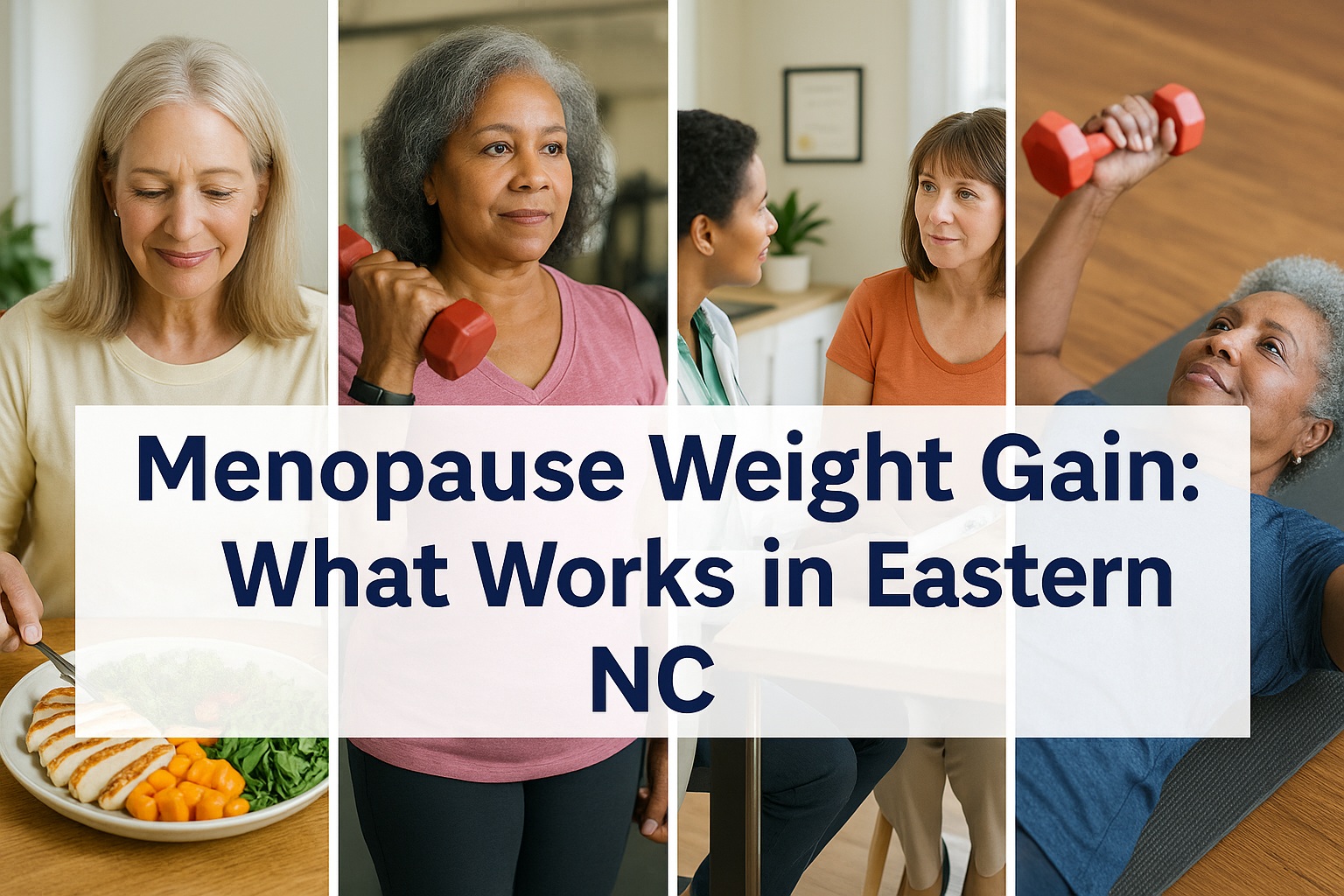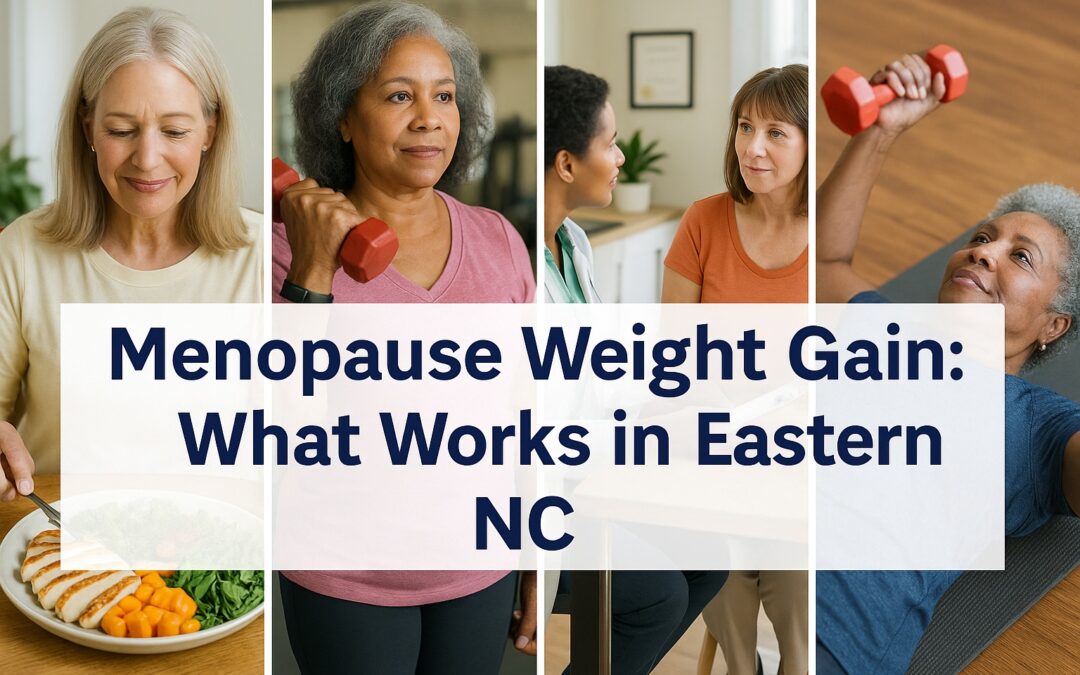Menopause Weight Gain: What Works in Eastern NC (Greenville, NC)
Quick take: You can’t control hormones, but you can control your plan. In Greenville and across Eastern NC, the most reliable way to manage menopause-related weight gain is a protein-forward plate, progressive strength training, daily movement, better sleep, and—when appropriate—clinician-guided medical options.
Why Weight Gain Rises Around Menopause
Lower estrogen shifts fat storage toward the abdomen and can reduce lean muscle. Add sleep changes, hot flashes, stress and a bit less activity, and the scale creeps up. The solution isn’t a crash diet—it’s protecting muscle, improving insulin sensitivity, and building routines you can keep in Greenville, Winterville, Ayden, Farmville, New Bern, Kinston, and Rocky Mount.
What’s changing in your body
- Lean mass drops without strength + adequate protein.
- Fat distribution shifts to the midsection (“menopause belly”).
- Sleep & stress can raise appetite and reduce activity.
What Actually Works (Evidence-Based)
1) Protein-forward plate
Aim for roughly 1.2–1.6 g protein per kg body weight per day (personalize with your clinician). Center meals on lean proteins (fish, poultry, Greek yogurt, tofu), add high-fiber carbs (beans, oats, sweet potato), colorful veggies, and healthy fats. This supports muscle and keeps you fuller, longer.
- Greenville-friendly swaps: grill at home, choose beans/greens at local spots, keep Greek yogurt/fruit on hand.
- Plate guide: ¼ protein, ¼ smart carbs, ½ veggies; add fruit and water.
2) Strength training 2–3×/week + daily steps
Muscle is your metabolism’s ally. Start with full-body lifts you can learn quickly: goblet squats, dumbbell rows, hip hinge (RDL), push-ups (incline), overhead press, and carries.
- Beginner set: 2 sets of 8–10 reps, 6 exercises, 30–40 minutes. Progress weekly.
- NEAT goal: 7,000–9,000 steps/day using the greenways and parks around Greenville.
3) Fiber, smart carbs & Mediterranean pattern
High-fiber carbs improve satiety and blood sugar control: oats, beans, lentils, berries. Mediterranean-style eating (olive oil, fish, plants) is sustainable and heart-healthy.
4) Sleep & stress hygiene
- Consistent sleep/wake time; cool, dark room; limit screens late.
- Short evening walks or light yoga on stressful days.
Medical Options & Safety
Hormone Therapy (HT)
HT primarily treats menopause symptoms (like hot flashes) and may indirectly help weight control by improving sleep and comfort. It’s not a weight-loss drug. Discuss suitability and risks/benefits with your clinician. ACOG overview.
Nonhormonal options for symptoms
Evidence-based nonhormonal choices include paroxetine 7.5 mg and fezolinetant 45 mg for vasomotor symptoms—helpful if HT isn’t appropriate. These can support sleep/comfort so lifestyle changes stick. See the NAMS position statement.
GLP-1 medications (e.g., semaglutide)
GLP-1s can be effective for postmenopausal women with overweight/obesity. Some 2024 data suggest women on HT may respond even better—but long-term habits remain essential, especially to avoid regain after stopping therapy. Work only with licensed prescribers; avoid unapproved products sold online.

Medication is a tool; sustainable habits keep results.
Our Eastern NC 12-Week Framework
Weeks 1–4: Reset & Foundation
- Assessment + body composition scan
- Protein target set; 2 strength days; 6,500–7,500 steps
- Sleep schedule and hot-flash plan (HT/nonhormonal if indicated)
Weeks 5–8: Progress & Plateau Breaker
- 3 strength days; add intervals or brisk walks
- Fiber to 25–30 g/day; hydration habit
- Medication evaluation if appropriate; monthly check-in
Weeks 9–12: Sustain for Real Life
- Maintain 3 strength days; step goal 8,000–9,000+
- Restaurant guide for Greenville/New Bern
- Relapse plan (travel, holidays)
Costs, Insurance & Appointments (Greenville, NC)
We’ll review your coverage, out-of-pocket options, and whether labs/medications are appropriate. We serve Greenville, Winterville, Ayden, Farmville, New Bern, Kinston, and Rocky Mount.
FAQs
Why do many women gain weight after menopause?
Estrogen decline shifts fat distribution and lowers lean mass; sleep and stress changes add up. Good news: targeted nutrition and progressive strength can improve body composition at any age.
Will hormone therapy help me lose weight?
HT primarily treats symptoms (e.g., hot flashes). It isn’t a weight-loss drug, though improved sleep/comfort can support healthy habits. Discuss risks/benefits with your clinician.
Do GLP-1 medications work for postmenopausal women?
Yes, semaglutide shows weight-loss efficacy; some data suggest HT users may respond better, but habits still matter to prevent regain after stopping.
How much protein is ideal during menopause?
Many women do well around 1.2–1.6 g/kg/day (personalized by your clinician) to support lean mass with resistance training.
What’s the best exercise for “menopause belly”?
A mix: 2–3 strength sessions weekly, daily steps/NEAT (e.g., 7–9k+), plus 1–2 cardio bouts. Consistency beats intensity.
Ready to start? Book your Menopause-Smart consult in Greenville, NC.
Disclaimer: Education only; not a diagnosis or substitute for medical advice. Results vary. Consult your healthcare provider.

